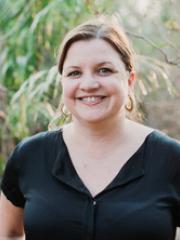Dr Caroline Graham

Researcher biography
Dr Caroline Graham is an award-winning investigative journalist who specialises in narrative non-fiction storytelling across both traditional and new media formats, including podcasting, data-driven reporting and longform creative non-fiction. Caroline is the co-author of the Australian bestseller Larrimah (Allen & Unwin, 2021), which was shortlisted for an Indie Book Award, Ned Kelly Award and two Davitt Awards. Caroline is also the co-author and co-producer of the investigative true crime podcast series Lost in Larrimah (The Australian, 2018), which won a Walkley Award, an NT Media Award and was a finalist in the Quills Awards and the Australian Podcasting Awards. In addition to writing feature stories and creative non-fiction for a range of publications (including The Australian, The Weekend Australian Magazine and The Guardian), Caroline has co-authored Writing Feature Stories: How to research and write articles, from listicles to longform (Routledge, 2017). She has received a national Office of Learning and Teaching Citation for her approach to teaching data-driven journalism and has co-ordinated student-authored data-driven investigations for The Guardian, Crikey and New Corp Australia. In 2023, she co-wrote/co-produced the ABC Landline documentary Outback Musical, as well as an accompanying multimedia feature that won a Clarion Award. She has also investigated (for The Australian, 2023) access to education in remote parts of the Northern Territory, supported by a Meta/Walkley Foundation grant for public interest journalism. She also writes fiction, has worked as a consulting producer/script editor on podcast series and has written for or collaborated on a number of hybrid new media or cross-platform projects.
Caroline's academic research interests centre around the application of journalistic ethics and traditions to emerging media formats, including data-driven reporting methodologies, the ethics of true crime podcasting, the evolution of narrative journalism formats, notions of subjectivity in a new-media landscape, regional, rural and remote reporting and the emerging solutions journalism movement. Through her work on the Larrimah projects, she also has an enduring interest in Northern Territory war and rail history, the myth of the outback, small towns, the Australian identity and missing persons cases. She is open to public-interest collaborations with industry or the not-for-profit sector, as well as cross-disciplinary research and practice opportunities.
